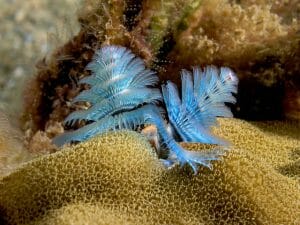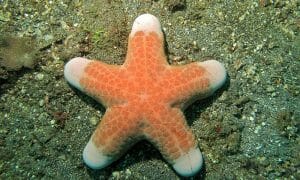Tropical oceans like the Pacific have more decomposer organisms than the Atlantic or Arctic oceans because of the warmer temperatures. Overall, the main decomposer organisms in marine ecosystems are bacteria. Other important decomposers are fungi, marine worms, echinoderms, crustaceans and mollusks. In the colder ocean waters, only bacteria and fungi do the decomposing because the other creatures cannot survive in the extreme conditions.
Ocean decomposers have a variety of methods for gathering dead material to feed on. Echinoderms like sea urchins, sea stars and sea cucumbers hunt and eat live food, but they also move around and consume decaying organic matter that covers rocks and other surfaces. Marine worms like the Christmas tree worm have feathery appendages which they spread out and use to catch organic matter floating in the water. These larger marine decomposers are also called macrodecomposers.

Marine decomposer organisms such as this Christmas tree worm, Spirobranchus giganteus, use their feathery appendages to catch organic matter in the water.

Echinoderm decomposers in the ocean include the granulated sea star, Choriaster granulatus which cleans up dead organic matter by moving along rocks and other stationary surfaces.
References
- Decomposers in the Ocean: Role and Examples. (n.d.). Retrieved October 9, 2017, from https://www.buzzle.com/articles/decomposers-in-the-ocean-role-and-examples.html
